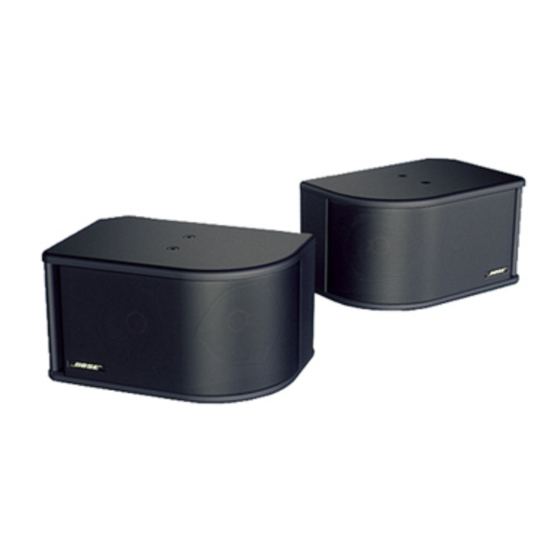Bose L-Bracket 203 Service Manual - Page 6
Browse online or download pdf Service Manual for Speakers Bose L-Bracket 203. Bose L-Bracket 203 14 pages. Loudspeaker l-bracket
Also for Bose L-Bracket 203: Installer's Manual (7 pages), Installation Instructions (2 pages)

Power Amplifier
-
+
+
-
Frequency
Generator
Figure 1. Model 203™ Loudspeaker test
setup diagram
Note: Refer to Figure 3. Model 203 driver
wiring diagram for the following procedure.
1. Phase test
1.1 Remove the speaker grille using
procedure 1.
1.2 Observing polarity, apply a +6Vdc level
to the input terminals on the rear of the
loudspeaker. The speaker drivers should
both move outward.
1.3 Replace the grille using procedure 2.
Note: Refer to Figure 1. Model 203
Loudspeaker test setup diagram, for the
following tests.
2. Rub and tick test
2.1 Remove the grille using procedure 1.
2.2 Apply a 6 Vrms, 10 Hz signal to the
input terminals on the rear of the speaker
cabinet.
2.3 Listen carefully for any buzzes, rattles,
or other extraneous noises from the drivers
or trim parts.
Note: There is a normal suspension noise.
To distinguish between a rub or a tick and
suspension noise, displace the driver cone
slightly with a finger. If the noise stays the
same, it is suspension noise.
TEST PROCEDURES
-
+
+
-
DMM
+
Loudspeaker
-
2.4 Replace the grille using procedure 2.
3. Air leak test
3.1 Remove the grille using procedure 1.
3.2 Apply a 6Vrms, 60Hz signal to the
input terminals on the rear of the speaker
cabinet. Leave the speaker port open.
3.3 Test duration should be 5 seconds
minimum.
3.4 Listen carefully for air leaks along all
glue joints, at the binding post connector,
and at both transducer mounting locations.
Air leaks will be heard as a hissing or
sputtering sound. All repairs must be
hidden.
3.5 Replace the grille using procedure 2.
4. Power sweep test
4.1 Apply a 6Vrms, 10Hz signal to the
input terminals on the rear of the speaker
cabinet. Leave the speaker port open.
4.2 Sweep the input frequency from 10Hz
to 3 kHz.
4.3 Reduce the input voltage level to
4Vrms and sweep the oscillator from 3kHz
to 5kHz.
Note: The whooshing noise from the port
at approximately 60Hz is acceptable.
4.4 Replace any transducer that has a
buzzing noise. There shall not be any
buzzes or rattles from the internal
connecting wires or components.
Redress any buzzing wires.
5
